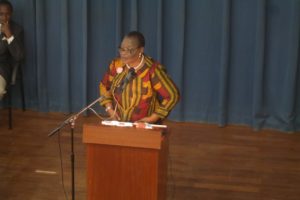
By Idris Uwaisu
Candidates for the upcoming presidential election in Nigeria are lining up. Former vice president Atiku Abubakar is the latest politician to announce that he is running for the office. It is his fifth attempt.
71-year-old Atiku Abubakar was nominated by the main opposition People’s Democratic Party (PDP) to challenge the incumbent, Muhammadu Buhari in elections scheduled for February 2019. Abubakar is a well known politician and billionaire businessman from the north of Nigeria. He has had to put up with some ribbing, since this is his fifth bid for the presidency.
But in the view of veteran politician Isa Tafida Mafind, Abubakar is a political heavyweight, and exactly what the PDP needs. “This is a very serious challenge,” he told DW. “As of now the change in the whole administration of governance in Nigeria is on the cards, because the president can’t continue behaving the way he was behaving before knowing Atiku will run for the PDP.”
The hope for a debate on crucial issues
Abubakar comes from the Muslim-majority north, following an inner-party rule that candidates should be alternately from the south or the north of the country. As it happens, the incumbent is also a Muslim from the north. Issues of religion and tribalism have always played an important role in Nigerian politics. In the past, politicians have made the most of these divisions for electoral reasons. This time, the differences between the main contenders will not be as stark.
Usman Mohammed, a political analyst at the Center for African Legislative Studies in Abuja, hopes that the campaign will be more about issues like corruption and less about personalities. “Nigerians will benefit by putting these two candidates to the test and listening to debates on economic growth and development,” he told DW. Mohammed believes that what matters is that the candidates tell Nigerians what they plan to do to move the country forward.
President Buhari’s All Progressive Party’s (APC) sweep into power in 2015 was the first victory of an opposition party at the ballot box in the country’s history. For a long time he seemed to be sure to win a second mandate in 2019. But the odds have dwindled in recent months, as the APC is hit by a wave of defections over Buhari’s leadership style.
Questions about the candidate’s wealth
Abubakar rose from humble beginnings and worked his way through the ranks of the customs service for two decades, before switching to the private sector and investing in oil services and agriculture. He then joined the government and became one of Nigeria’s most recognizable and enduring politicians.
Nevertheless he has been dogged by corruption and shady business deals allegations, as well as, controversies over his numerous wives and more than 20 children.
While Abubakar is seen by analysts as the main rival for Buhari in upcoming elections, other parties have chosen well-known candidates too. The Allied Congress Party of Nigeria (ACPN) nominated former minister Obiageli Ezekwesili, a co-founder of “Bring Back Our Girls” as their candidate. The group was formed to raise awareness about more than 200 girls kidnapped by Boko Haram terrorists in 2014.
A woman’s plan to fight corruption
55-year-old Ezekwesili’s credentials include a run as former vice president for Africa at the World Bank. She said at her nomination that she would reform the state-owned oil company, NNPC, enable the private sector to create jobs and focus on human capital development. A co-founder of the organization Transparency International, she was considered for the 2018 Nobel Peace Prize in recognition of her anti-corruption work.
Among the 16 politicians who have announced plans to run for the presidency is Donald Duke, the former governor of Cross River state. Nominated by the Social Democratic Party, Duke is known foremost as the initiator of the Calabar carnival, now considered “Africa’s biggest street party.” Duke is a respected politician not associated with graft or corruption, popular for the efforts he put into developing tourism in his state.








